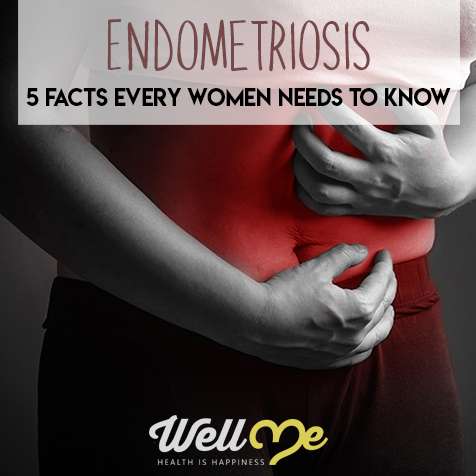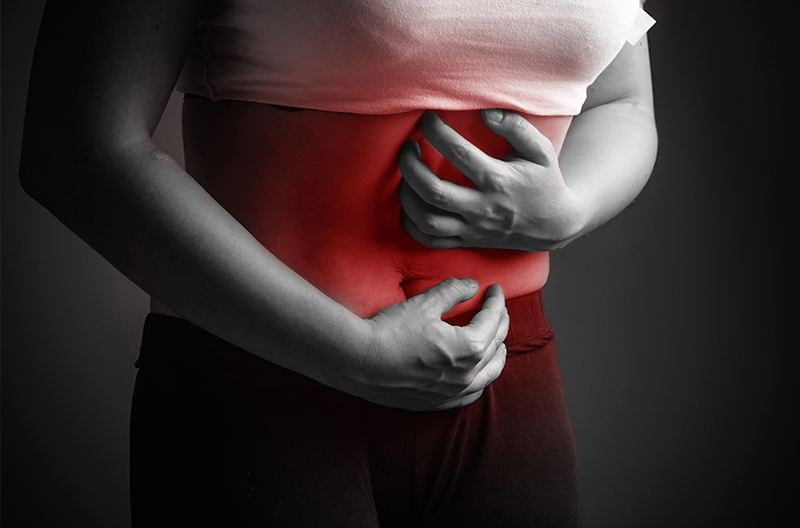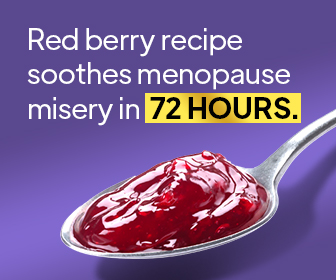Endometriosis is a common health concern for women in the United States. This condition is dangerous because it so often goes unnoticed, yet causes serious problems. Treatments do exist for endometriosis, but it is important to identify the problem early-on to ensure that treatments are maximally effective and that the overall risk of endometriosis to your health and quality of life is reduced.
This article will take you through all the key facts about this elusive condition so you can understand the difference between endometriosis and common menstrual cramps. Having a working understanding of this condition is necessary to ensure that you are health-aware and to prevent any further complications.
What Is Endometriosis?
Endometriosis is a condition where the tissues near but outside the uterus act like uterus lining. This basically means that areas like the fallopian tubes or similar structures shed their lining much like the uterus. This can be incredibly uncomfortable, much like regular menstruation.
The problem with endometriosis is that it is easily confused with menstrual cramps, as the sensation is similar and it tends to occur at the same time as regular period pains. This condition tends to manifest as a series of uncomfortable symptoms in and around the uterus and other sexual organs, such as:
- Pain in the abdomen, pelvis, or lower back (areas surrounding the uterus)
- Period pain that is debilitating in nature
- Pain during or after sexual intercourse
- Pain during urination or excretion
- Persistent nausea, diarrhea, constipation, or other digestive issues
- Long-term fertility problems
Clearly these are not trivial symptoms, and they can affect your long-term fertility and quality of life. Endometriosis is a silent, painful condition that many women are unaware of until it is too late – improving your awareness is the best way to combat the condition.
Symptoms of Endometriosis
Endometriosis occurs when cells that make up the lining of the uterus are found elsewhere in the body. Commonly, this includes places such as the inside and outside walls of the fallopian tubes, the outside wall of the ovaries, and the outside wall of the uterus itself. Endometriosis is a chronic and highly-debilitating condition that causes painful and heavy periods. It can lead to infertility and fatigue as well as bowel and bladder problems.
The significant impact this condition has on a woman’s life can manifest in many ways including:
- Chronic pain
- Fatigue or lack of energy
- Depression and isolation
- Problems sex life and relationships
- An inability to conceive
- Difficulty in fulfilling work and social commitments
Endometriosis can affect all women and girls of childbearing age, regardless of race and ethnicity. Within the U.S., hundreds of thousands of women suffer from endometriosis and the number may even be in the millions, with symptoms commonly being overlooked as “normal”. However, with the correct treatment and awareness, many of the debilitating symptoms can be addressed and made manageable. It is important to remember that endometriosis is not infectious, contagious, or a form of cancer.
Symptoms of endometriosis can vary in intensity from one woman to another, and the volume of tissue affected by endometriosis does not always correspond to the amount of pain and discomfort experienced. Some women with endometriosis can even be totally asymptomatic, making the condition incredibly hard to detect.[1]
As well as the classic symptoms of endometriosis (painful, heavy or irregular periods, pain during or after sex, infertility, painful bowel movements, and fatigue), women with endometriosis also report other symptoms:
Pain Symptoms
- Painful periods
- Pain on ovulation
- Pain during and internal examination
- Pelvic pain
Bleeding Symptoms
- Heavy periods with or without clots
- Prolonged bleeding
- ‘Spotting’ or bleeding between periods
- Irregular periods
- Loss of ‘old’ or ‘dark blood’ before period
Bowel and Bladder Symptoms
- Bleeding from the bowel
- Symptoms of irritable bowel (diarrhea, constipation, bloating-particularly during your period)
- Pain when passing urine
- Pain before or after passing urine or opening bowel
Other symptoms
- Tiredness/lack of energy
- Depression
- Back pain
- Leg pain
These symptoms have other possible causes, however, and may not necessarily be symptoms of endometriosis. Make sure you seek medical advice to clarify the causes of any symptoms. If a diagnosis of endometriosis takes place and symptoms change afterward, it is important to discuss these changes with your doctor. It’s all-too-easy to start putting all your health symptoms down to endometriosis, but that is not always the case.
Of course, period pain can be completely normal – but what is normal? Period pain, in most cases, is caused by contractions in the uterus. Blood vessels in the muscle wall are compressed and blood supply to parts of the uterine wall is temporarily cut off, starving these areas of tissue of oxygen and adding to discomfort.
Endometriosis pain, however, is typically more extreme and more frequently debilitating. Each month these misplaced cells react to hormonal changes in the same way that correctly-placed cells lining the uterus do. The cells break down and bleed, but unlike those lining the womb, the blood resulting from this process has no way to escape. This trapped blood causes inflammation, pain, and the formation of scar tissue.
Causes of Endometriosis
The actual cause on endometriosis is unknown. There are several theories about its cause, but none fully explain the condition. The greatest possibility is that a combination of the following factors could be causing endometriosis to develop in some women:
- Retrograde menstruation
- Genetic predisposition
- Lymphatic or circulatory spread
- Immune dysfunction
- Environmental causes
- Metaplasia
Retrograde Menstruation
When you have a period, some of the endometrium flows backwards through the fallopian tubes and into the abdomen. This tissue is then free to implant itself onto organs in the pelvis and grow. It is suggested that almost all women experience some degree of this retrograde bleeding, but some are able to clear the tissues better than others. However, this theory does not explain the occurrence of endometriosis in women following hysterectomy or in men who have been exposed to estrogen through drug treatments.
Genetic Predisposition
Research suggests that endometriosis can be present in multiple generations of a family. Therefore, it is reasonable to suspect that genetics could play a role in the likelihood of an individual developing endometriosis. Genetics are expressed through the lens of lifestyle, and while genetic composition can expose you to increased risks of endometriosis, it is not a matter of fate.
Lymphatic or Circulatory Spread
Endometriosis tissue particles are also thought to travel around the body. This transport could take place via the lymphatic system or the blood stream, and it could explain why endometriosis cells have been found in regions such as the eyes and brains in some patients.
Immune Dysfunction
Many women with endometriosis appear to have reduced immunity to other conditions. It is not known whether this is a factor that contributes to endometriosis or a result of the condition. If you are experiencing exceptionally heavy menstruation and reduced immune function, this provides a great way to differentiate between endometriosis and regular periods.
Environmental Causes
This theory suggests that endometriosis is secondary to exposure to toxins in the environment. Certain toxins, such as dioxin, can have an effect on the body, its immune system and its reproductive system and cause endometriosis. Research studies using animals have shown that, when the animals are exposed to high levels of dioxin, they can me triggered to develop endometriosis. However, the research has not yet been proven to be effective in humans.
Metaplasia
Metaplasia is the process by which one type of cell changes into a different kind of cell. This normally occurs in response to inflammation and enables cells to change and adapt to their surrounding environment (e.g. Barret’s dysplasia in the esophagus). In the case of endometriosis, metaplasia would explain how groups of endometriosis cells appear seemingly spontaneously inside the body (including in areas such as the lungs and skin). This theory would also explain the occurrence of endometriosis in women with no uterus or in men who have taken hormone treatments.
Two theories exist surrounding metaplasia:
- The change from one type of cell into endometriosis cells happens as an embryo, when cells are still naturally multi-potent.
- The change from one type of cell into endometriosis cells happens in adulthood as some adult cells retain the multi-potency they had as embryonic cells
Endometriosis and the Bladder
Endometriosis affecting the bladder is rare, but endometriotic tissue can penetrate the bladder either superficially or deep into the organ. Superficial endometriosis is found in the outside surface of the bladder while deep endometriosis is found on the inside of the bladder wall and can cause a nodule, which can also affect the ureter.
The signs and symptoms for endometriosis of the bladder can vary throughout the menstrual cycle, but symptoms tend to be worse in the days before and during a period. These symptoms can include:
- Bladder irritation
- Bladder urgency
- Pain when the bladder is full
- Occasional blood in the urine during a period
- In some cases, pain in the area of the kidneys
Diagnosis of bladder involvement can be done by your doctor after full investigation. Investigations can include vaginal examination, ultrasound, CT and/or MRI.
Endometriosis and the Bowel
Endometriosis can affect the bowel in a similar way to which it affects the bladder. Once again there are two levels of penetration. Superficial endometriosis is found on the surface of the bowel and deep endometriosis penetrates the bowel wall. In some cases, recto-vaginal nodules can start as superficial and progress to infiltrate the bowel wall.
Symptoms of bowel involvement in endometriosis are similar to those or irritable bowel syndrome and other serious digestive problems. However, unlike IBS, symptoms are likely to vary with the menstrual cycle and worsen in the days before and during a period. Symptoms of bowel endometriosis include:
- Pain on opening the bowels
- Deep pelvic pain during sex
- In some cases, rectal bleeding during a period
If you note that your bowel symptoms follow a monthly pattern, there is the potential you have bowel involvement – this should be discussed with your doctor. Investigations will take place to confirm any diagnosis, bowel investigations can include sigmoidoscopy and/or laparoscopy.
Endometriosis, Fertility, and Pregnancy
Endometriosis does not necessarily cause infertility. There is, however, a strong association between endometriosis and fertility problems. For instance, tuberculous endometriosis is considered to be a common cause of infertility in certain countries, although this is not as significant an issue in the United States.[2]
The reasoning behind endometriosis affecting a woman’s ability to get pregnant naturally is that as severity of endometriosis increases scar tissue becomes more common. There is an association between the formation of this scar tissue or adhesions and the chances of a women becoming pregnant naturally decreasing. This relationship is not fully understood.
In cases of minimal to mild endometriosis, sufferers have an almost normal chance of conception, but some sufferers are infertile for unclear reasons. In cases of moderate to severe endometriosis, chances of natural conception are reduced due to the increased number of adhesions that can trap the egg cell and stop it from moving down the fallopian tube as normal. Drug treatments have not been proven to improve levels of fertility in these circumstances but the removal of cysts, adhesions, and nodules during surgical treatment has been found to be effective in increasing the chances of conception.[3]
Emotional Support
Remembering the psychological impact of a condition such as endometriosis is often as important, if not more important, than the treatment of the physical symptoms. It is completely normal to feel in-need of emotional support after the diagnosis of a condition such as endometriosis. Endometriosis can have a profound emotional effect on women living with the condition, as well as those around them -particularly their partners.
It is important that you do not feel afraid to ask for support when feeling upset or confused about endometriosis or any other condition you might have. It is all too easy to shut loved ones our because you feel you do not want to burden them with your problems or you feel they will not understand. However, if you do feel able to talk to them, you may find it a great source of comfort and support.
Additionally, any good doctor should be able to refer you to a counselling service specifically tailored to you and your condition.

Summary: What Should You Do Now?
Being aware of endometriosis and catching the condition early is the best way to ensure that you are able to protect yourself from the associated dangers. This is an unpleasant condition and can develop into severe problems with the bowel, bladder, and other tissues. If you suspect that you have any of the symptoms of endometriosis, it is a good idea to consult with your OBGYN at your next check-up.








